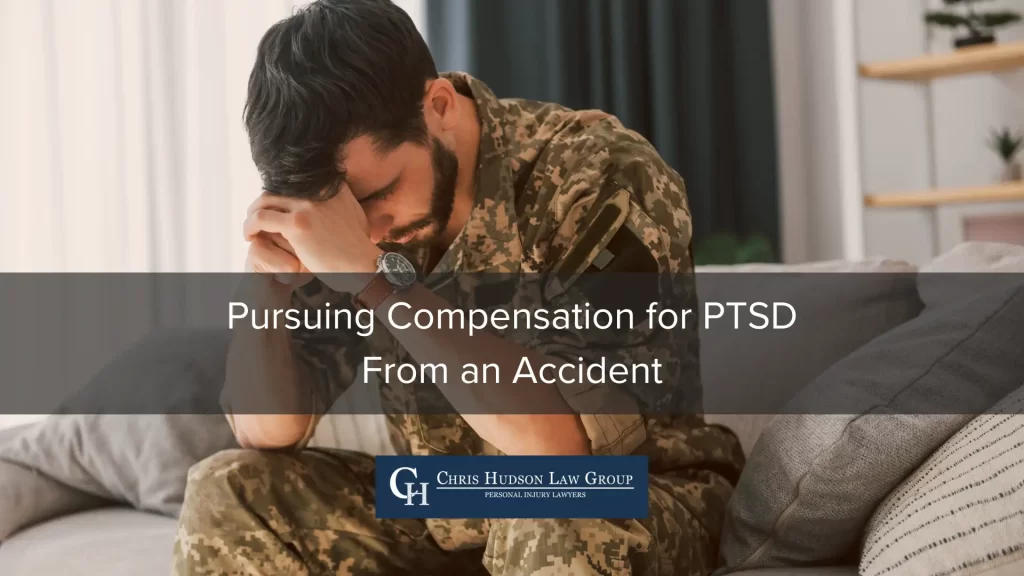
When you get into an accident caused by someone else, you may be focused on your physical injuries. You don’t realize just how much the event affected you psychologically. It’s not uncommon for someone to develop post-traumatic stress disorder (PTSD) from an accident. The sudden injury and the feeling of helplessness or horror if you see it coming can contribute to a serious mental disorder affecting all aspects of your life.
Are you considering filing a claim or lawsuit to recover compensation? If so, you may wonder if your mental health treatment cost can be included in your settlement amount. A skilled personal injury lawyer can help you understand your options after someone else’s wrongdoing has injured you.
What Is PTSD?
Post-Traumatic Stress Disorder is a mental disorder triggered by experiencing or witnessing a traumatic event. Sometimes, the symptoms may not immediately present but develop over the days and weeks following the event.
Accident victims may be unable to go near the scene of the accident. If they were injured in a car crash, they may be unable to ride in or drive a car. Or, they may have trouble focusing on work due to intrusive thoughts or flashbacks to the event. The toll on an injury victim’s mental health can be serious. Some people may develop depression in addition to the PTSD symptoms.
How Do You Know If You Have PTSD From Your Accident?
A study published by the National Library of Medicine notes that PTSD is caused by actual or threatened death, violence, or serious injury. Signs and symptoms of PTSD include flashbacks to the incident, avoidance of situations like the initial situation, and intrusive thoughts.
A mental health professional should be the one to determine your PTSD diagnosis. You may wish to make an appointment with a psychologist or psychiatrist if you’re experiencing:
- Avoidance of the area where the accident occurred
- Insomnia or nightmares
- Recurring, involuntary, intrusive memories
- Flashbacks
- Moodiness or negative feelings
- Exaggerated startle response
- Hypervigilance
- Avoiding thinking or talking about the accident
- Self-destructive behavior
- Lack of enjoyment in activities you used to enjoy
- Damaged relationships or pulling away from friends and family
Treatment for PTSD
Fortunately for many people with PTSD, with time and treatment, they can find healing and recovery.
Therapeutic Interventions like the following are often useful in the treatment of PTSD:
- Cognitive Behavioral Therapy (CBT): CBT helps patients identify and reframe negative thought patterns and behaviors related to their trauma.
- Prolonged Exposure Therapy (PE): This is a specific type of CBT that exposes patients to memories of the traumatic event in a safe environment. Over time, this helps decrease the emotional intensity of the memories.
- Eye Movement Desensitization and Reprocessing (EMDR): This involves recalling traumatic events while making guided eye movements. This process can help change the emotional response to these memories.
- Group Therapy: Sharing experiences and feelings with others who have PTSD can offer validation and reduce feelings of isolation.
Medications can also be helpful in reducing PTSD symptoms. Commonly prescribed drugs include antidepressants, like selective serotonin reuptake inhibitors (SSRIs) and serotonin-norepinephrine reuptake inhibitors (SNRIs). These can alleviate mood disturbances and other related symptoms. It’s important to consult with a psychiatrist or primary care provider to find the right medication and dosage.
Mindfulness and Relaxation Techniques provide a more holistic element to care. Approaches like meditation, deep breathing exercises, and progressive muscle relaxation can help manage PTSD symptoms by reducing anxiety and enhancing self-awareness.
Alternative Therapies can also be useful, such as:
- Art and Music Therapy: Expressing oneself through art or music can provide a therapeutic outlet for trauma-related emotions and memories.
- Animal-assisted Therapy: Interacting with animals, particularly dogs or horses, can provide emotional support and build trust.
Everyone heals on their own timeline, and what kind of treatment works for one person may not work for another.
Does Insurance Cover Therapy Costs for PTSD in Georgia?
Yes, many insurance plans in Georgia cover PTSD-related therapy. Consult with a lawyer to learn more about whether you can pursue coverage under the relevant policy’s terms.
Can You Sue for PTSD After an Accident?
If you developed PTSD after an accident caused by someone else’s actions or inaction, you could include the costs of treatment and medication for the condition as part of your settlement demand. However, your attorney will need to prove that the PTSD was a result of the accident.
What Is the Average Compensation for PTSD After an Accident?
It’s hard to get a true average figure for accident settlements in Georgia and even more difficult to determine what portion of the settlement or award was specifically for PTSD. Settlements can range from a few thousand dollars to millions, depending on the extent of the injuries and other losses. In general, the more serious your physical injuries, the higher the settlement will be.
How Do You Prove You Have PTSD?
 Proving that you have PTSD from an accident is usually done by using your medical records as evidence. Your therapist may make a statement about the triggering incident and the kind of treatment you’re undergoing.
Proving that you have PTSD from an accident is usually done by using your medical records as evidence. Your therapist may make a statement about the triggering incident and the kind of treatment you’re undergoing.
You will also have to prove the effects of PTSD on your life. Keeping a daily journal can help. You should note when you have intrusive thoughts and cannot concentrate on work or school. You may also detail when you have flashbacks, nightmares, or other symptoms. If you have certain triggers from the accident that affect your life, note those, too.
For you to obtain compensation for your condition, your attorney must prove that you have PTSD from the accident and that it has had a negative effect on your life. An expert medical witness could be called in to explain how the accident caused your PTSD, for example.
Do You Need Help Pursuing Compensation After an Accident?
Do you need help pursuing compensation against the party whose wrongdoing caused your accident? We can help you explore your options and evaluate the strength of your case. Contact Chris Hudson Law Group at (706) 863-6600 for a free case evaluation with an Augusta personal injury lawyer. We are committed to demanding the highest possible settlement for accident victims suffering from PTSD, and we’re ready to fight hard for you.
Related posts
Can Insurance Companies Deny Claims for Pre-Existing Conditions?
